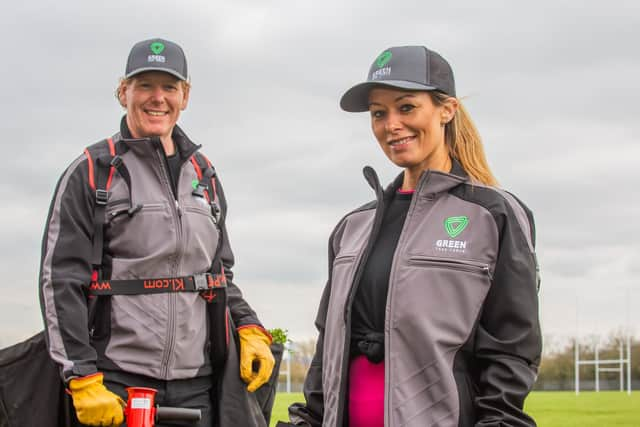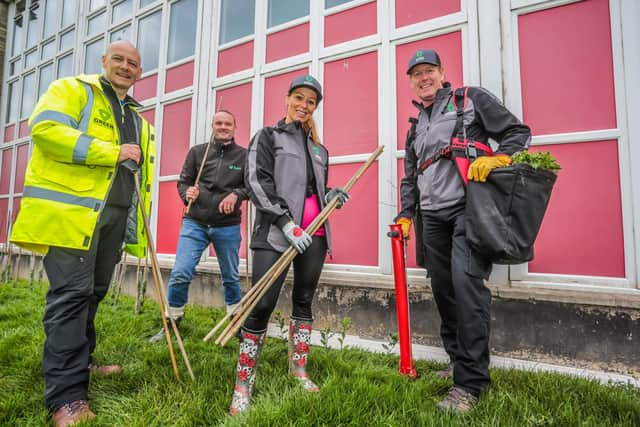Meet the former Navy aircraft technician from Hull helping to reforest Britain
You’ve heard the phrase ‘a lightbulb moment.’ Ex-Navy aircraft technician Andrew Steel’s lightbulb moment came during a conversation with Yorkshire Water when, faced with a commitment to plant one million trees, “They said to me: ‘How on earth are we going to achieve this?’”
It didn’t take the Hull-born, 50-year-old engineer-turned-entrepreneur very long to come up with the answer.
Advertisement
Hide AdAdvertisement
Hide Ad“I had set up a charity planting trees across Asia, mainly in Sri-Lanka and Thailand. For a dozen years we planted over three million trees across seven countries there. After 18 years abroad, I returned to the UK to find the British Government had committed to planting 600 million trees.


“I know from experience this is not going to be achieved through volunteers and charity alone. Without a well-managed programme and a delivery partner it will not happen.”
Andrew’s response to the Government’s ambition has been to develop a unique business model that draws on his twin areas of expertise: trees and people. Not just any people: veterans.
“In September 2020 I set up a business to re-trains ex-forces personnel as arboriculturists and horticulturalists, either to set-up in business themselves or do work for us directly.”
Advertisement
Hide AdAdvertisement
Hide AdEmploying ex-forces personnel is Andrew’s key calling card when it comes to negotiating with local authorities and the Government.


“What people don’t realise is the scale of former services personnel who suffer with post-traumatic stress disorder (PTSD). 17% of those who have been in a combat situation experience it, and more than one in twenty ex-armed forces do in general.
“For them, working outdoors is nature-based therapy. It has mental health and well-being benefits. They are also eminently suited to it, hiking, setting up camp, airlifting equipment and even living outside, all while still getting a full day’s work done. Ex forces personnel are trained for this. Who better to manage and deliver our green commitment?”
Andrew cites the intense work ethic and camaraderie of ex-forces personnel. It extends to their social lives. He himself played services rugby, captaining the Navy team. “There was a time in my life when I looked around the battlefield and all I saw was rugby players.
Advertisement
Hide AdAdvertisement
Hide Ad“Bringing services people back together is like re-uniting a family; they are amongst their own and it brings them great comfort.”
Those Andrew re-trains with the assistance of the Forestry Academy can work with him directly but are also given support to set-up their own businesses doing tasks like hedge cutting, grounds and garden maintenance, agricultural installations and literally dozens of other things that connect them with the natural world.
The idea of trees being natural therapy is not ‘new-age,’ says Faith Douglas, curator of Thorp Perrow Arboretum in Bedale, says, “Trees naturally give off something called ‘phytoncides’, or ‘wood essential oils’, these oils when inhaled have been scientifically proven to have a beneficial impact on our nervous systems. This means that quite simply being within a wooded area we can see our stress levels reduced, mood disorders be more balanced and our overall quality of life improved.”
Douglas is not the only one who sees the bigger picture: modern medicine does too. Says Andrew, “Dr Peter Brambleby, a former NHS Director of Public Health, told me that planting trees and working in nature is better for people than taking pills.”
Advertisement
Hide AdAdvertisement
Hide AdMere months after Andrew’s lightbulb moment, he set up in November 2020, he now has over 50 ex-forces personnel working alongside him, several full-time and many on a project basis.
Through an ex-Navy colleague at construction and facilities management firm, BAM, he got assistance with his business plan, website and PPE. He now has accreditations for his business and environmental systems that are not even possessed by the Queen’s tree surgeons.
“I have a five-year roll-out strategy to set-up the Green Task Force across the UK. I’ve had interest from the Ministries of Defence and Environment, several local authorities, and MP Johnny Mercer, a former Army officer.
“It will take 25-years to deliver the Government’s commitment. I want veterans to be at the heart of this.”
Advertisement
Hide AdAdvertisement
Hide AdThe Government’s commitment includes planting over 50 million trees in the Northern Forest alone. Having planted thousands of trees here already, Andrew is well-placed to deliver across this part of England but he has already set up in Scotland, Wales and West Cumbria too.
“The North Yorkshire Dales alone has a need for 12 million trees. Put together with West Cumbria that’s 3,000 acres of land along. The Government didn’t have a delivery plan or capability when it made its commitment but my aim is to provide one for it that it can use anywhere in the UK.
Tree planting may sound simple, but it is not without its problems. Knowing the planting season is one: “It’s estimated that around 50% of the trees given away by charities die because they are not planted properly.
“Local authorities can be lulled into thinking that volunteers offer a low-cost answer to tree-planting, but there are other factors such as managing the volunteers and public liability costs that they need to consider. There’s the matter of where the trees come from too, especially post-Brexit.
Advertisement
Hide AdAdvertisement
Hide Ad“What we should be aiming for is sustainable forestry with a professionally trained and managed programme that also has community benefits.”
It is a far cry from his navy career as an engineer which took him across the world from Sierra Leone to landing Chinook helicopters. When he’s not saving the planet he’s still outdoors – cycling gruelling routes to stay fit.
There’s no doubting he has the credentials to make Britain’s green dream a reality. His charitable work in the field of sustainability has already won him the United Nations SEED award for entrepreneurship in sustainable and economic development. Hull University awarded him an honorary doctorate in 2012 in recognition of his extensive work in the field of environmental science.
His rapid growth means he has already extended his sight beyond former services personnel.
Advertisement
Hide AdAdvertisement
Hide Ad“The blue-light industries have a similar adaptability and sense of can-do, trusting each other and delivering in the face of adversity. They sometimes suffer from what you might call ‘battle fatigue,’ especially after these awful past few years.”
For now, Andrew’s main source of combat is with funding bodies, application forms and the challenge of doing ‘woodland maths’ in his head at night.